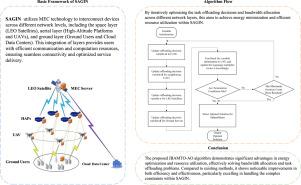Alternating optimization for energy consumption-oriented task offloading in SAGIN
IF 4.6
2区 计算机科学
Q1 COMPUTER SCIENCE, HARDWARE & ARCHITECTURE
引用次数: 0
Abstract
As a fundamental framework for future mobile communication systems, the Space-Air-Ground Integrated Network (SAGIN) leverages Multi-Access Edge Computing (MEC) technology to provide communication and computation resources to users by connecting devices at different network levels. However, current task offloading schemes often suffer from suboptimal energy consumption performance and fail to balance various constraints, such as communication resources, computation resources, maximum allowable task delay, and the maximum coverage time of Low Earth orbit (LEO) satellites. To address these issues, this paper focuses on the energy consumption-driven task offloading problem within SAGIN. Our approach differs from existing models by explicitly considering the aforementioned constraints in the task allocation process. To tackle the complexity of the original problem more efficiently and to provide a structured way to address both the communication and computation processes, the problem is formulated into two subproblems: the bandwidth allocation problem and the MEC task offloading decision problem. To solve these subproblems, we propose the Joint Bandwidth Allocation and MEC Task Offloading decision-alternating Optimization (JBAMTO-AO) algorithm. The CVX toolkit and the alternating direction method of multipliers (ADMM) distributed algorithm are employed to address the decomposed subproblems effectively. Extensive experimental evaluations show that the proposed JBAMTO-AO algorithm outperforms existing offloading methods in terms of both the total energy consumption of system tasks and the satisfaction degree of task maximum tolerable delay.

SAGIN中面向能耗任务卸载的交替优化
作为未来移动通信系统的基本框架,天空地综合网络(SAGIN)利用多接入边缘计算(MEC)技术,通过连接不同网络级别的设备,为用户提供通信和计算资源。然而,目前的任务卸载方案往往存在能耗性能不优、无法平衡通信资源、计算资源、最大允许任务延迟、近地轨道卫星最大覆盖时间等约束的问题。为了解决这些问题,本文重点研究了SAGIN中能量消耗驱动的任务卸载问题。我们的方法与现有模型的不同之处在于在任务分配过程中明确地考虑了上述约束。为了更有效地解决原问题的复杂性,并提供一种结构化的方法来解决通信和计算过程,将问题制定为两个子问题:带宽分配问题和MEC任务卸载决策问题。为了解决这些子问题,我们提出了联合带宽分配和MEC任务卸载决策交替优化(JBAMTO-AO)算法。利用CVX工具箱和交替方向乘法器(ADMM)分布式算法对分解后的子问题进行了有效求解。大量的实验评估表明,JBAMTO-AO算法在系统任务的总能耗和任务最大可容忍延迟的满意度方面都优于现有的卸载方法。
本文章由计算机程序翻译,如有差异,请以英文原文为准。
求助全文
约1分钟内获得全文
求助全文
来源期刊

Computer Networks
工程技术-电信学
CiteScore
10.80
自引率
3.60%
发文量
434
审稿时长
8.6 months
期刊介绍:
Computer Networks is an international, archival journal providing a publication vehicle for complete coverage of all topics of interest to those involved in the computer communications networking area. The audience includes researchers, managers and operators of networks as well as designers and implementors. The Editorial Board will consider any material for publication that is of interest to those groups.
 求助内容:
求助内容: 应助结果提醒方式:
应助结果提醒方式:


